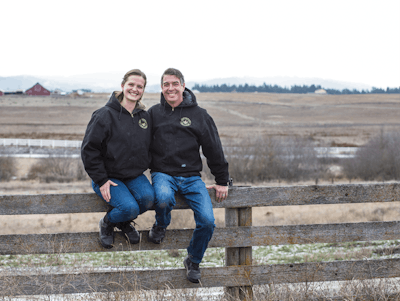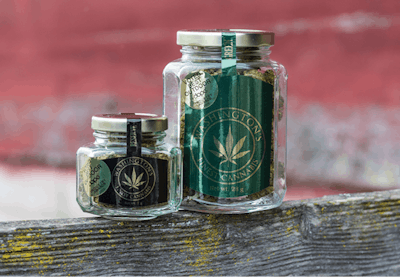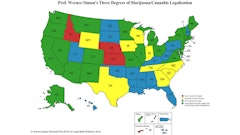
The term “power couple” is what this issue’s special Guest Interviewer, Eugene Flynn, used to describe Crystal and Kevin Oliver, and it quickly became evident why. Together they operate Washington’s Finest Cannabis, an award-winning, Tier-3 farm in Spokane County. But they are also tireless advocates working to advance cannabis legalization, and protect consumer rights and industry businesses.
Kevin is co-founder and chief strategic officer of Washington's Finest Cannabis, as well as the executive director for the Washington State chapter of NORML (National Organization for the Reform of Marijuana Laws), and he sits on the organization’s national board of directors. He provided strategic support for I-502, the citizens' initiative that legalized recreational cannabis in Washington in 2012, making Washington and Colorado the first states to legalize and regulate cannabis statewide.
Crystal is Washington's Finest Cannabis' co-founder and president, and sits on the executive board of the Cannabis Farmers Council. She has represented cannabis farmers' interests as a member of the Washington State Building Code Council’s Cannabis Issues Technical Advisory Group, Spokane Clean Air’s Marijuana Advisory Committee, and Spokane Conservation District’s Voluntary Stewardship Program.
Both have appeared before government agencies, and their efforts have had a significant impact on Washington's cannabis landscape, with Kevin’s efforts with NORML advocating for legalization and cannabis consumers, and Crystal’s efforts resulting in regulatory reform on behalf of cannabis businesses.
In this candid interview, Flynn — a managing member of Stevens County, Wash., Tier 2 producer Canna Herb Farms — talks with the Olivers about their advocacy efforts, lessons learned from the front lines of a brand-new, highly regulated industry, their advice for other cultivation businesses and their struggle for a work-life balance amidst it all.
Eugene Flynn: Kevin, can you tell us a bit about your Tier-3 farm?
Kevin Oliver: A Tier-3 allowance is a 30,000-square-foot canopy. The majority of our grow is dedicated to outdoor production. We also have a few thousand square feet devoted to indoor cloning, vegetation and maintenance of our genetics throughout the year. Crystal is the majority owner of our company, and I hold a minority position. We have only a handful of employees, which of course increases seasonally at harvest time.
Flynn: Crystal, your advocacy is well-known in the Washington cannabis world. Could you talk about some of the primary issues facing the industry?
Crystal: Over the last couple years, my advocacy has really centered around protecting opportunities for small businesses and family farms to successfully participate in the cannabis market. I find myself often reminding regulators that I-502 was designed with small and medium businesses in mind. It's rare for a promising business opportunity to be made available to small, rural operators and families, and I think that should be protected and encouraged. I worry about the recent trend of consolidation in the industry, which seems to go against both the letter and the spirit of I-502. This is a problematic issue facing the industry.
I'm also a member of a work group under the auspices of the Spokane Conservation District Voluntary Stewardship Program, which centers around protecting critical areas as they intersect with agriculture (which cannabis farming is). A primary focus at the moment is the protection of water resources and the aquifer here in Spokane.
Also, we know that the Washington State Liquor and Cannabis Board (LCB) is currently focusing on quality-assurance issues relating to testing standards, pesticide action levels and the like. Other issues coming up soon include an overhaul of the traceability system, one way or another, and proposals regarding new packaging and labeling requirements.
Flynn: As business owners, you both stay up-to-date with the LCB’s regulatory initiatives. What policies or actions has the LCB introduced over the last few years that you think were beneficial?
Crystal: A key thing the LCB got right from the beginning, based on the express provisions of I-502, were the protections put in place for small-business owners, specifically the cap on the canopy space allotted per licensee, limiting the number of licensees a person could own, and prohibiting vertical integration, [so] farmers and retailers could not be under common ownership. Unfortunately, it seems the LCB is undoing this small-business friendly framework with some of its more recent decisions that tend to favor larger farmers.
Flynn: Would you point to any other missteps that you have seen on the part of the LCB?
Crystal: We were not happy with the recent action of LCB to withdraw pending applications for those who had applied for more than one license. We ... had applied for the maximum limit of three licenses and obtained the land to build those out. Initially, because of the large number of applications received by the LCB, we were only allowed to build out one licensed canopy space, with the option of releasing the other two applications or placing them on hold. We opted to place them on hold, but were recently advised that such pending applications would not be honored and our application fees were refunded.
Flynn: Many farms grow many different strains. Your farm has taken a different approach. Could you comment on this?
Crystal: Because the LCB limited each new licensee to a 15-day window for bringing in its initial (unlimited) supply of plants and seeds, there was definitely this attraction to bring in as many genetics as possible. A number of growers brought in as many as several hundred different types of genetics, for fear of not having access to them in the future.
We did take a different track. Our first year we harvested a single strain, [which] we knew did well in the microclimate of our farm. So we were confident that it was a good strain with a lot of good qualities.
Our second year we brought out a second strain, and this year we brought four strains to market. Each one is unique in its terpene profile, as well as its effect. We were determined that anything we brought to market was a really solid product and worth the customer's money. So we have been very diligent in doing different seed trials and evaluating phenotypes, and that's how we've become comfortable with offering four strains.
Flynn: Spokane County is home to, by far, the largest number of producer-processors in the state of Washington, up to 147 at last count. The next-highest counties have fewer than 100. What are the advantages of outdoor cannabis cultivation in Eastern Washington?
Crystal: In Spokane County, we have a lot of sunshine. We also have a winter, so the growing season is somewhat limited by that, while at the same time the cold weather tends to keep outdoor pests to a minimum.
Another key reason why cannabis farming is thriving in Spokane County is that while some other counties in the state have similar outdoor growing conditions, Spokane has the advantage of having the best employment base to draw from. Cannabis is a fairly labor-intensive crop, so you definitely need to have access to employees.
Flynn: What is your approach to pests and pesticides?
Crystal: Washington State significantly limits the number of pesticides we're legally permitted to utilize on the cannabis plants, and these are primarily organic pesticides.
We’ve been able to get away from the use of pesticides. Instead, we've been relying on integrated pest management techniques, including the introduction of predatory insects such as ladybugs, praying mantises and predatory mites.
In addition, we have found that in our outdoor cultivation there have been fewer issues with pests. I think that has a lot to do with the day-to-night temperature fluctuations outdoors, creating an inhospitable environment for pests.
Flynn: I suppose any small business is full of surprises for those who enter into it. What surprises did you come across when you entered into cannabis farming?
Crystal: I have been surprised by the number of times I've had to explain to regulators that cannabis is a plant and that growing it is a form of agricultural production, … [and that] what I was doing should be categorized as a farming activity, [not] an industrial activity.
Kevin: Being a small business owner is fraught with responsibilities and stressors. It's 24/7 regardless of what business you're in. But in this business, with the rules being written on the fly, so to speak, it makes for a very dynamic business environment, more so than that of most business sectors. It's a new industry with high regulatory oversight, and any day may bring a new surprise in that regard.
Flynn: What advice might you have for other producer-processors? In asking this question I'm aware that, Kevin, you literally wrote the book; you are the primary author of the book “Idiot's Guides: Growing Marijuana.”
Kevin: Yes, buy the book! [Laughs] I would say to keep the number of your strains manageable. Keep the strains you like. And really keep the consumer in mind in all your business practices; they are the backbone of this industry. They're financing the industry with their purchases. And we owe it to them to make sure they'll have safe products to consume.
Crystal: It's really important to keep up-to-speed on the regulatory agencies that are making decisions that impact your business. I believe that if you choose to be a cannabis entrepreneur, you need to be informed and that you should know your elected officials. Better yet, they should know you.
It’s also really critical to involve yourself and become a member of some sort of cannabis industry association. I am a member of several. We’ve mentioned the Cannabis Farmers Council and NORML, but there are many others in Washington and nationwide as well. Getting connected with those sorts of groups can be extremely beneficial to a cannabis business startup because of the wealth of information that members are willing to share. These groups are also a way in which to get your voice heard regarding laws and regulations that affect farmers and other licensees.

Flynn: You are both tireless advocates, plus operate a farm and have a family. Can you talk about life-work balance and how you juggle all of this and maintain your sanity?
Kevin: We don't maintain our sanity, that just comes and goes in waves. And we're not tireless, we're tired all the time. At least, that's how it sometimes feels.
Crystal: We’re conscious of this and are working toward a better work-life balance for our family. Of course, not being able to take our children with us onto the parts of the property where the farm is located has been a challenge. For the first couple years, our office was our kitchen table, so I would work on administrative duties with the children around. … We've recently been able to move the office into another building.
But … we’re still seeking solutions.
Flynn: Hindsight, they say, is 20/20. Looking back are there decisions you wish you had made differently or missed opportunities you might have taken advantage of?
Crystal: Had we known that the LCB was going to limit us to one license, my husband and I would have each applied for licenses separately instead of as a couple, in order to secure at least the two licenses. Of course, there was no way we would have known that they would have changed that policy from what they initially said it was.
It would have also been neat if we could have convinced some of our family members and friends to apply for either cultivation licenses or retail licenses. But the reality is that our family members were very fearful of federal charges being brought against us and didn't want to take that kind of risk. I see other folks who had family and friends who did apply, and I see that it has benefited their businesses.
Kevin: Amen.























